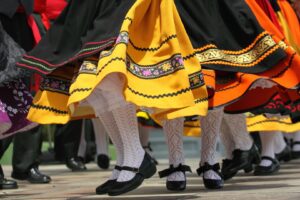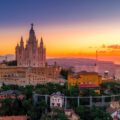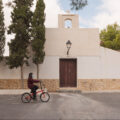Spain: From ‘National Catholicism’ to a pluralistic society
Spain: From ‘National Catholicism’ to a pluralistic society
With Spain’s transition to democracy with the 1978 Constitution, the last four decades have seen the Church’s grip on social and moral norms steadily loosen. What does this mean for Spanish society?
This article is part of our series on normativity in Europe.
Since the days of the counter-reformation, Spain has often been perceived as a nation in which the Catholic Church holds significant sway in dictating the norms of society. Whilst this notion was consistently reinforced during the 20th century, particularly by the ubiquitous role of the Church under the Francoist dictatorship, Spain has moved away from such a commitment to religion in more recent decades. In 2021, it has a government that openly promotes the idea of the country being a ‘pluralistic’ nation in terms of faith.
It is, therefore, important to ask what this transformation to a more pluralistic religious community means, both for the Catholic Church and for the wider Spanish society itself.
Catholicism as a basis for the state
Following the defeat of the Second Republic by the fascist forces of Francisco Franco during the Spanish Civil War (1936-1939), the Catholic Church was given great power to dictate the moral and social norms of the nation. With this power, the authoritarian state and the Church developed a ‘symbiotic relationship’ by which the two institutions worked hand in hand to create the official state ideology of ‘National Catholicism’.[1]
During the 36 years of dictatorship that followed, Catholicism was given a central role in the design of the education system, leading decisions about curriculum and rituals. The faith also served as the normative basis of many laws, ranging from the prohibition of contraception, abortion, and divorce, to censorship, which banned ideas that were considered to challenge ‘ideological and cultural uniformity’.[2]
The secularisation of public life
However, with the death of Franco in 1975 and Spain’s transition to democracy with the 1978 Constitution,[3] the last four decades have seen the Church’s grip on social and moral norms steadily loosen.
In no small part, this transformation has been underpinned by rapid secularisation. The number of practising believers (in any faith) fell from 50% in 2000 to just 26.6% in 2018.[4] The consequence of this demographic change is particularly stark when we consider that just one in 10 Spaniards between the ages of 15 and 29 describe themselves to be ‘practising Catholics’.[5]
This rapid pace of secularisation has been matched by a consistent process in which elected progressive governments have sought to implement reforms that often explicitly challenge the normative role of the Church. Perhaps the most notable instance of this was Spain becoming just the fourth country in the world to legalise gay marriage in 2005 despite widespread opposition from Catholic clergy. [6]
This trend has continued until the present day. The current progressive coalition government has recently taken steps to permit euthanasia, clearly defying the beliefs of the Catholic faith. It also further reduced the role of Catholic teaching in the public education system.[7] [8]
A pluralistic Spain
However, whilst this dual process of secularisation and changes to law has demonstrated the reduced power of the Catholic Church as a political force, it is important to note that this does not equate to the complete removal of religion as a basis for norms and morals in Spain’s wider society.
The key change is that whilst the Catholic Church may have felt in the past that it held a monopoly over such questions, it is now one voice among many others. The current government has made a clear attempt to promote the idea of Spain as a religiously plural nation.
Evidence of this change was clear at the memorial for deaths from the first wave of the COVID-19 pandemic. Unlike in previous memorials of national tragedies, this memorial was not held at a cathedral but instead in a strictly non-confessional setting. Furthermore, rather than the memorial being led by members of the Catholic clergy, bishops were invited to sit alongside other faith leaders as equals.[9]
The significance of this type of change is reflected in the leadership of Vice-President Carmen Calvo, who over the past two years has conducted meetings with the leaders of minority faiths in Spain, including Protestants, Orthodox Christians, Muslims, Jews, and Buddhists. During an online webinar with leaders of NGOs focusing on religious pluralism in May 2021, Calvo commented that adapting Spain’s public institutions to a pluri-religious society “helps us to maintain democracy, to widen it and to pass it on to future generations.”[10]
This message of religious pluralism is not purely a political or ideological belief, but in fact what Calvo has referred to as the ‘new reality’ of Spanish society. Notably, whilst the number of practising Catholics is falling, the number of Muslims in Spain passed 2 million in 2019.[11] Similarly, there has been a rise in the number of Evangelical Christians as well as Orthodox Christians, many of whom are migrants from Romania.[12] [13]
To conclude, over the last four decades Spain has witnessed a profound transformation in the relationship between religion and the norms and morals which form the basis of public life. As the nation moves forwards to an increasingly pluralistic reality, the challenge of creating consensus around social and moral questions, without having the normative basis of the Catholic faith, offers both opportunities but also dangers.
Our team of analysts conducts research on topics relating to religion and society. In the second half of 2021, we are focusing on the subject of normativity. Find out more on the EARS Dashboard.
Sources
[1] The Catholic Church after the Spanish Civil War.
[2] Franco’s invisible legacy: books across the hispanic world are still scarred by his censorship
[3] The Transition to Democracy in Spain and Portugal
[4] Losing their religion? New report shows Spaniards are turning their backs on faith
[5] Religion in Spain: a primarily Catholic nation
[6] Spain legalises gay marriage | World news
[7] Spain passes law allowing euthanasia BBC News – World
[8] Estos son los puntos más controvertidos de la «ley Celaá»
[9] A new reality for the Spanish Catholic Church
[10] Carmen Calvo: “La realidad de nuestro país es de diversidad, la democracia nace para asumirla, sostenerla y protegerla”
[11] Los musulmanes rozan los 2 millones en España y aumenta la emigración entre los más jóvenes
[12] El laberinto ortodoxo español | Revista | Observatorio del pluralismo religioso
[13] Los evangélicos, cerca del 2% de la población en España






